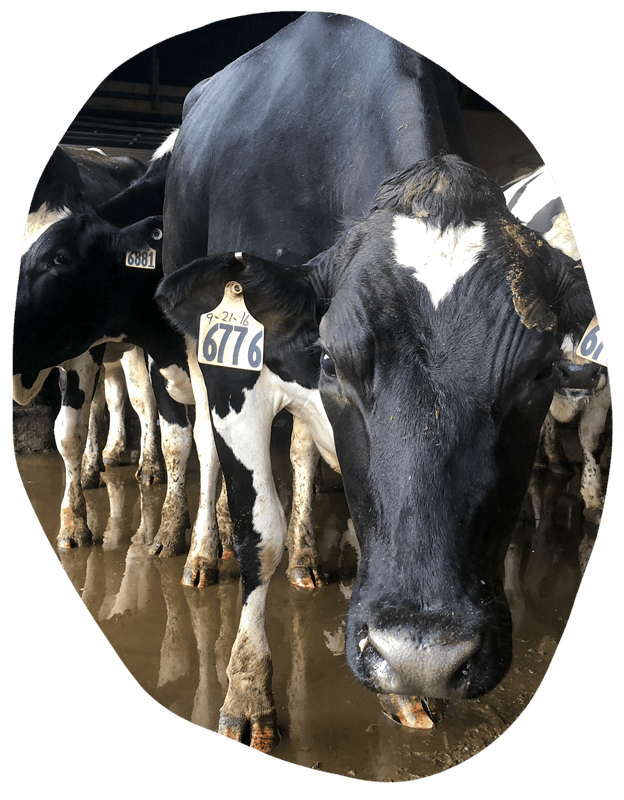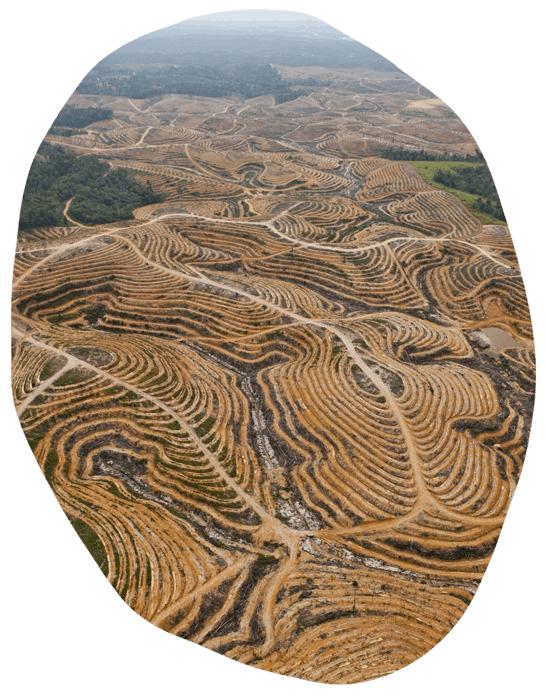Why Plant Based Treaty?
Animal agriculture is a major contributor to the climate crisis
There is a climate, ocean and biodiversity crisis. Fossil fuels and animal agriculture are the driving force behind runaway global warming as well as extensive biodiversity loss, large-scale deforestation, species extinction, water depletion, soil degradation and ocean dead zones.
Addressing fossil fuels alone is not enough — we need action on food systems too; that’s where the Plant Based Treaty comes in. The three main greenhouse gases — carbon dioxide, methane and nitrous oxide are at record levels and rapidly accelerating; animal agriculture contributes to all three but is the main driver of methane and nitrous oxide emissions globally.
Animal agriculture is driving Indigenous land theft in the Amazon; subjecting racially and ethnically marginalized communities to disproportionate amounts of toxic waste from factory farms and slaughterhouses as well as exposing workers to toxic chemicals, hazardous working conditions and severe trauma.
Scientists warned in the IPCC sixth assessment that we need to cut methane or face collapse. Lead reviewer Durwood Zaelke said methane reductions were probably the only way of preventing temperature rises of 1.5C above pre-industrial levels, otherwise extreme weather will increase and several planetary tipping points could be triggered, from which there is no coming back. Zaelke points out that “cutting methane is the biggest opportunity to slow warming between now and 2040. We need to face this emergency.”
In short, the three greenhouse gases must be tackled both urgently and with equal measure. Plant-based and soft energy solutions that can mitigate this disaster are within our grasp — we just need to implement them.


Business as usual is not an option
We urgently need to act on the available science, bringing together all actors from various sectors of society under one agreement, which will actively address the escalating climate crisis.
There has never been a more urgent need for a Plant Based Treaty. The Paris Climate Agreement is silent on animal agriculture, despite it being a critical contributor to global warming and an essential part of meeting climate goals. As the independent policy institute Chatham House observed in their 2014 report, ‘shifting global demand for meat and dairy produce is central to achieving climate goals.’ This position is strongly supported by scientists around the world, including Oxford University researcher Michael Clark, who points out that ‘even if fossil fuel emissions stop immediately, emissions from our food systems alone could increase global temperatures by more than 1.5C’.
Swedish director of the Potsdam Institute for Climate Impact Research, Johan Rockström, who first identified and quantified our planetary boundaries says, ‘the risks we face are so large, business as usual is not an option’.

What is the Paris Agreement?
Adopted in 2015, the Paris Climate Agreement is a legally binding international treaty that commits almost every government in the world to addressing the climate crisis.
The treaty aims at limiting global warming to 1.5°C in order to avoid the worst impacts of global warming. The Paris Agreement acknowledges that any temperature rise will result in life altering consequences for our planet, but beyond 2°C will be catastrophic. Any rise in temperature raises the possibility of ice-free Arctic summers, mammals losing more of their habitat and greatly increasing the area of wildfires, as detailed by the United Nations Climate Change.
Overwhelming scientific evidence
The Paris Agreement leaves it to countries, businesses and individuals to make changes. However, transformative changes to our food system have been largely ignored and at times even resisted at the government level.
The overwhelming scientific evidence lays bare the calamitous impact of animal agriculture on our planetary boundaries and points to a plant-based food revolution as an essential solution. According to ProVeg International and prominent scientists from a range of academic and research institutions, it will be impossible for any government to meet the goals set under the Paris Agreement without a major shift towards plant-based diets, even if current fossil fuel emissions are completely halted.
Animal agriculture is ‘responsible for around 66% of all food’s annual emissions, yet provides only 18% of calories’
– Johan Falk, 2020
Flying into the furnace
The Earth’s average temperature is already more than 1°C over the pre-industrial era, and the last five-year period has been the warmest on record. In 2021 the UN weather agency, the World Meteorological Organization reported that it is becoming increasingly likely that average global temperatures will rise beyond 1.5°C in at least one of the next five years, with a 90% likelihood of at least one year between 2021-2025 becoming the hottest on record.
Global temperatures are linked to the concentration of CO2 in the atmosphere. According to Dr James E.Hansen from the Earth Institute, the safe level may be 350 parts per million (ppm), however that level was reached in 1998 and we exceeded a record high of 420 ppm in April 2021. The IPCC believes that once we exceed 450 ppm, a 2°C temperature rise may be inevitable.

Why a Plant Based Treaty?
Just like the Paris Agreement, the Plant Based Treaty recognizes that no one single country can tackle the ecological impact of animal agriculture by itself. A global solution to a global emergency is essential to avert a climate catastrophe.
Through both individual and system change, communities, business and government can work together at all levels and every point of intervention.
Adopting a vegan diet is the single biggest action a person can take for the planet and the IPCC agrees that a shift towards plant-based diets can significantly reduce food related greenhouse gas emissions. An Oxford University study calculated that large changes in the food system would be necessary, that is, everyone adopting a plant-based diet on a global scale, to reduce food emissions as much as 70%.
Beyond emissions
As a companion to the Paris Agreement, the Plant Based Treaty offers those meaningful solutions and a solid pathway that will reduce our planetary impact. With a legally binding commitment to our three R’s: Relinquish, Redirect and Restore, nations can meet and exceed their emission reduction targets as well as absorbing the excess carbon from the atmosphere through rewilding and reforestation, bringing us down to safe levels. Not only that, but a Plant Based Treaty will positively impact on multiple other areas of perilous concern, such as:
- Methane and nitrous oxide levels
- Deforestation and land use change
- Species extinction and biodiversity loss
- Water and air pollution
- Eutrophication
- Ocean dead zones, acidification and coral bleaching
- Risk of zoonotic disease and pandemics
- Public health and well-being
- Food deserts and accessibility
- Protection of indigenous communities
In fact, a shift towards a plant-based food system positively impacts on more planetary boundaries than any other climate solution.

The time is now
The very first global stocktake of the Paris Agreement is taking place from 2021-2023 and the process will be repeated every 5 years. The stocktake will assess the world’s collective progress.
The conclusions of the stocktake will not be policy-prescriptive, however they will consist of recommendations, best practices, new opportunities and lessons learned.
Therein lies an opportunity for the Plant Based Treaty to be included in those recommendations. If we build momentum and create enough bottom up pressure from the public, scientists, businesses and municipal governments we can shape policies and help set the pace of reform. It’s time to make some noise!
How do we build momentum and pressure?
The existential threat we face as we sail towards a Mad Max scenario is of grave concern, but there is still time to turn the ship around. But we must act now and act fast.
And that’s where you come in! Whether you are acting alone or as part of a climate action group, school, hospital, business, or city, you can be part of a growing do-it-together movement forging change and helping build a brighter future for generations to come. Click here to start a PBT team or register for an introductory call.
Endorse the Plant Based Treaty if you haven’t already, then tell your friends, family and colleagues to jump on board. Visit our campaign hub to get active, make a donation if you can and subscribe to our newsletter for action alerts and updates.
For help and support adopting a vegan diet, take the vegan pledge. A plant-based diet is the most impactful action you can take to save the planet, however there is more you can do. Check out our guide to reducing your carbon footprint.

We can create a better world.
Let's grow.
Let's be friends
We love getting social, which is why you’ll find us on all the major social media platforms. We think it’s a great way to build an online community where we can share news, ideas and actions. We’d love for you to join us. See you there!





